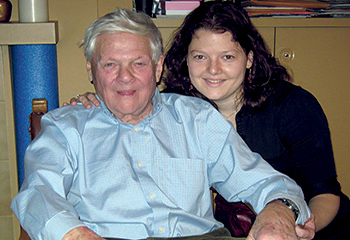George Brady is no stranger to awards. As the inspiration behind the acclaimed book, Hana’s Suitcase, he’s been honoured by Queen Elizabeth and the German government for his contribution to human rights and for promoting tolerance and respect.
Not long ago, the Czech Republic, where he and his sister Hana were born, decided it would bestow the prestigious Order of T.G. Masaryk, on the 88-year-old Holocaust survivor to help mark the country’s Independence Day. But what started as a generous manifestation of gratitude to a favourite son, turned into a national political scandal, as the country’s president, Milos Zeman, first announced he would grant Brady the award, and then withdrew it when Brady’s nephew, Culture Minister Daniel Herman, met with the Dalai Lama contrary to the president’s wishes.
Brady’s arrival in Prague for the Oct. 28 presentation touched off a national outpouring of support from dignitaries and the hoi polloi alike, as Czechs flocked to back him after President Zeman put political retribution ahead of bestowing the national honour on Brady.
“President Milos Zeman himself told me that if I talk to the Dalai Lama, my uncle will be removed from the list of winners. He told me at the Embassy of Slovakia in front of witnesses,” Herman told Czech public television, according to a report in The Times of Israel.
The controversy became front page news for days, while television and radio outlets gave the story blanket coverage.
The incident became known as “the Brady affair,” Lara Brady, George’s daughter, stated.
Anger at the president’s decision – believed to be prompted by pressure from China, with whom the Czechs have substantial economic relations – led many universities, politicians and city governments to step into the breach and bestow their own honours on Brady. Prime Minister Bohuslav Sobotka, for one, presented Brady with a humanitarian award while the local Jewish community gave him an award for his support of democracy and human rights.
READ: HOLOCAUST SURVIVOR FIGHTS INTOLERANCE, BIGOTRY AND HATRED
In another case, a 10-year-old boy who met Brady in the street presented him with a home-made medal that included the handwritten message, “For doing good deeds with your good heart.”
The reception in the Czech Republic was “overwhelming” and “unexpected,” Brady told The CJN. “I became the symbol of democracy.”
That’s something that would have been hard to imagine when he first told Hana’s story in the pages of The CJN in 2001.
Brady and Hana were Czech Jews who were imprisoned in the Theresienstadt concentration camp during World War II before being transported to Auschwitz, where Hana was killed at age 13.
Their story was later told in Hana’s Suitcase by author Karen Levine. The book became an international sensation, being translated into dozens of languages and added to reading lists in many classrooms.
The suitcase in the book’s title referred to the luggage brought by Hana to Auschwitz, which was confiscated by the Nazis. When Japanese Holocaust educator Fumiko Ishioka looked for a prop to aid her in teaching about the Holocaust, the Auschwitz Museum loaned her the suitcase. Later, after some extensive detective work, Ishioka located Brady in Toronto.
The rest, as they say, is history, and while Brady’s story has been told around the world, it wasn’t as well known in his native Czech Republic.
Ironically, Zeman’s decision to rescind the award gave the Brady story more publicity than could have been imagined while generating widespread sympathy for her father, said Lara.
The torrent of support touched Brady, who has spoken extensively about tolerance and respect in the wake of the Holocaust.
“For the people of the Czech Republic to learn about Hana, their own citizen, there are no words for it,” Lara said.
READ: WHY HANA’S SUITCASE REMAINS A TIMELESS STORY
“I cannot express it in words,” George added. “It is so overpowering to be a symbol for a whole country. It’s overwhelming.”
